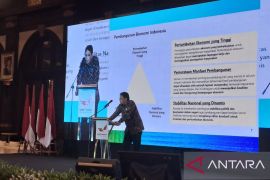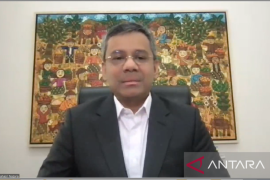Along with the growing variety of financial instruments, the fourth pillar is mandated to bolster the capacity of the monitoring authority to implement regulation and monitoring the technology methodJakarta (ANTARA) - Finance Minister Sri Mulyani outlined the government's five strategic pillars in designing the reformation of Indonesia's finance sector, one which concerns the expansion of long-term financial sources.
"This pillar specifically becomes a guideline in designing the development of the insurance industry and pension fund that collect long-term funding," the minister noted during the 2022 Indonesian Financial Group (IFG) International Conference here on Monday.
In addition, bolstering financial service access became the second pillar that is a foundation for improving financial institutions.
This is done by providing access to various products and services from financial institutions based on the people's needs, such as by utilizing financial information and technology or fintech.
Related news: Finance Minister targets economy to grow 5.3-5.9 percent in 2023
The third pillar concerns the strategy to improve competitiveness and efficiency of the finance sector.
This pillar emphasizes the creation of an efficient business process within the finance sector through innovation to establish healthy competition between industries.
Meanwhile, the fourth pillar revolves around the development of financial instruments and strengthening financial instrument risk mitigation measures.
"Along with the growing variety of financial instruments, the fourth pillar is mandated to bolster the capacity of the monitoring authority to implement regulation and monitoring the technology method," Mulyani explained.
The fifth pillar is improving protection for investors and consumers, with the goal of bolstering the people's trust to participate in Indonesia's financial market and ensure its integrity and fairness.
Related news: Gov't proposes Rp74.9 trillion in additional energy subsidies to DPR
Public's trust in the finance sector is expected to become an important foundation for Indonesia to improve the sector.
It is also expected to ensure that financial service institutions and the financial market continue to innovate and improve their efficiency without eroding the trust of the public, investors, and consumers.
In addition to the strategic pillars, the minister highlighted that the framework for Indonesia's financial reformation is based on three goals: financial inclusion, better financial penetration, and financial stability.
Related news: Minister presses for improving women's access to financial services
"Harmonic arrangement for these three aspects is very fundamental and important to anticipate various developments in Indonesia related to the finance sector in the future," she added.
Based on these five strategic pillars and three goals, the design for reforming the finance sector had been formulated for the entire industry and financial market in the country.
Reformation in the finance sector is expected to be able to handle various problems in the industry, which involves strengthening the intermediation function and increasing high-quality investment opportunities, specifically in the finance sector.
Related news: Climate change, strict market liquidity among global threats: Minister
Related news: High inflation threatening global economy: Finance Minister
Translator: Agatha Olivia V, Fadhli Ruhman
Editor: Fardah Assegaf
Copyright © ANTARA 2022












